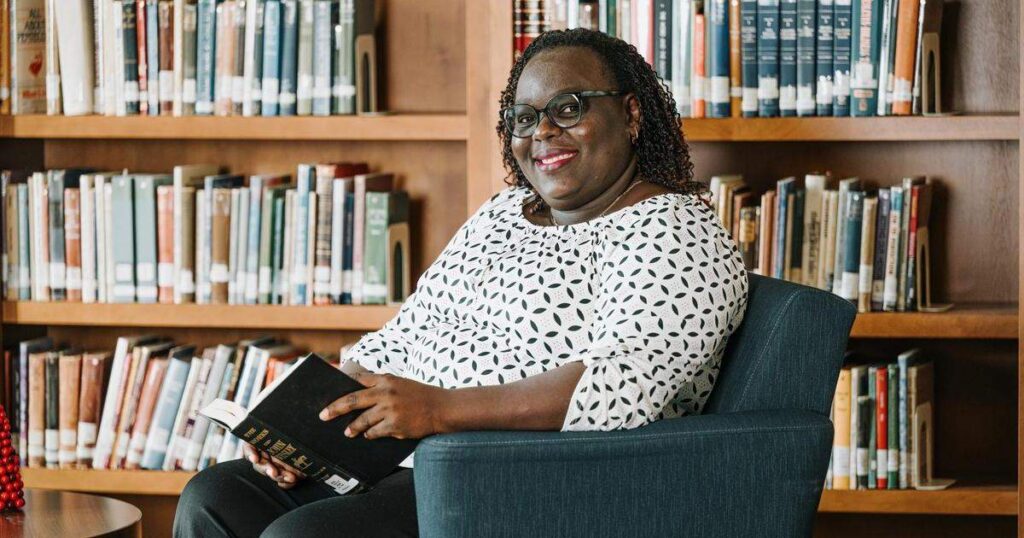By Dr. Julie Straight
How can people with different views on issues that matter have meaningful conversations?
My students in first-year composition may or may not care about writing a paper, but when I ask this question on the first day of class, they are with me. They are tired of the shouting stalemate they see in our current discourse, and they want to do better.
As educators today, and particularly in the humanities, we face several challenges: how do we lead students into worthwhile conversations and real learning on controversial issues? How can we help students overcome their natural obstacles to understanding others, especially understanding views different from their own? How do we help them “loosen up so they can learn,” as my colleague Paul puts it—to open up intellectually and emotionally so that they can engage with the world?
In 2019, these questions led me to take a course I found transformative from Eastern Mennonite University’s Summer Peacebuilding Institute: Formation for Peacebuilding Practice. Subsequently, I revised my beginning university writing course to center on this question of worthwhile conversation that values different views. Writing a paper with sources can feel more meaningful to students when framed as a case of honing a transferable skill that we all need every week, if not every day: listening to and learning from others different from ourselves. I hope that some description of this writing course will prove relevant to all those seeking good conversations, in or out of the classroom.
What do people disagree about in the world? Students have no trouble filling the whiteboard with hot topics of the day. But why do people disagree about these topics? As students name possible reasons, I steer them toward key concepts outlined by Douglas Stone, Bruce Patton and Sheila Heen in Difficult Conversations: How to Discuss What Matters Most. People approach any question with different information, different experiences, different reasoning and different values. Our emotions are involved; we fool only ourselves if we say that they are not. Furthermore, our self-interest influences us: It would hurt me if another view were right about this topic. Perhaps most importantly, our identities are at stake: I would no longer be myself if I changed my view on abortion or on gun rights; I would no longer belong in groups that matter to me—my friends, my family, my church.
From there, we go to a third question: What are worthwhile goals for talking with people who disagree with you on important issues? What does not work? Usually, people immediately sense attempts to change their minds, throwing up walls so fast that real conversation dies before it starts. But talking to learn, to understand, and to build a relationship can get us somewhere. It is worth showing your understanding by restating the other’s points such that they say, “Yes, that’s what I’m saying.” It is worth being understood yourself so that the other can see why you would think what you think. And perhaps most practically, it is worth addressing problems together. What do we agree needs to change, and what might we do together to change it?
This framework downsizes the task of argumentative writing, putting it within reach. The student need not convince anyone of anything—and a good thing, too, as none of us can control what goes on in another person’s mind. Rather, if the student shows understanding of others’ views and enables readers to understand where the student’s own view came from—what information, reasoning, values and perhaps experiences went into it—then the student succeeds.
After considering why people disagree and what aims are likely to be productive in conversations on controversial issues, we address very practical obstacles to such conversations, such as the following.
We are tired, and we do not listen well when we are tired. Therefore, in my context at a church-related university, I encourage my students to observe Sabbath—to stop their work for a whole day every week. Recognizing that many have commitments to employers, school and family that simply don’t allow for twenty-four hours of rest, I encourage them not to give up on this gift from God just because they can’t receive it fully. In fact, I offer extra credit for a Sabbath Step assignment in which they schedule and take some rest time each week, as long as it’s more than their current practice, even if not yet a full day. I encourage them in that sabbath time to do nothing that they ought to do, must do or should do. This odd assignment has received more consistently positive feedback than perhaps anything else I’ve done in my years of teaching. Ironically, Christian students are hungry for an opportunity to keep (this) one of the Ten Commandments without feeling guilty.
We are also in a rush, so we give little attention to anyone, certainly not to those saying things we do not want to hear. Since being in a hurry makes us less likely to be charitable to others in any way, let alone by careful listening, time management facilitates loving our neighbors. I require my students to complete an anti-procrastination exercise of their choice from a page of options based on work by David D. Burns, Matthew S. Boone and our University’s own Center for Academic Success and Advising.
Beyond these practical issues, of course, a significant obstacle to listening is simply the belief that I am right and that anyone with any different views is wrong. To help overcome this natural self-centeredness, each student writes an essay at the start of the term that responds to a prompt such as “You can’t understand me without knowing…” This essay helps me get to know them, and I hope it helps them increase their self-awareness. Awareness of their own identities is a step toward recognizing that their identities shape their views and that their thoughts come from a particular location–from who they are–rather than dropping into their minds straight from heaven. This awareness can help facilitate curiosity about people with different identities and their views.
How can people with different views on issues that matter have meaningful conversations? It is illuminating that, despite stained glass windows to the contrary, the young Jesus’s first recorded action in Luke is not preaching in the Temple. Rather, the climactic moment of Mary and Joseph’s three-day search through Jerusalem finds him there “listening and asking questions.” Only after this listening and questioning does Luke comment that “all who heard him were amazed at his understanding and his answers.” Imagine if those who followed Jesus were known as those people who encountered difference with curiosity and lengthy attention, listening and asking questions. Imagine if they were known for their keen understanding of what others were saying, such that people then wanted to ask them questions. Listening, asking questions, paying attention, showing understanding of the answers and responding in turn: Such conversation is not all we need to build peace, but it is a first step.
This post is reposted with the permission of Vocation Matters from the blog post of the same title by Julie Straight, NNU Professor of English, on vocationmatters.org. Read more of Dr. Straight’s posts and posts by other undergraduate educators at Vocation Matters: Insights and Conversations from the Network for Vocation in Undergraduate Education (NetVUE).







